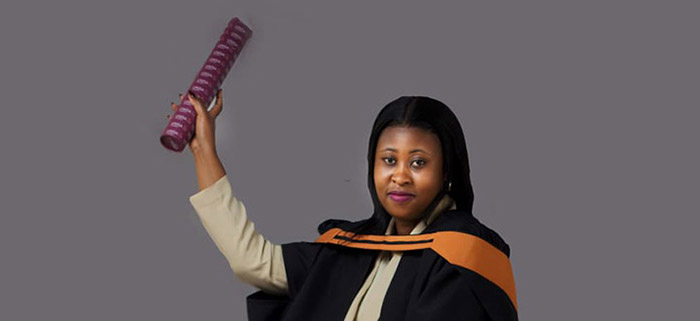College of Human Sciences
Setting eyes on the goal against the odds

Elda Makhadzi Mampuru
Unisa prides itself on being the largest African university, serving as a beacon of accessible education for the public at large. Through its affordable tuition fees, it remains committed to its mandate of providing learning opportunities to all South Africans, regardless of their socioeconomic backgrounds.
During the institution’s autumn graduation ceremonies, two women were recognised for having completed their studies against the odds. In June 2025, Elda Makhadzi Mampuru and Pitsi Khutso Ramoganyane, both obtained Bachelors in Information Sciences offered by the Department of Information Science in the College of Human Sciences (CHS). They did not allow their socioeconomic backgrounds to block their goals of obtaining qualifications.
Mampuru, the daughter of a domestic worker, grew up in an informal settlement, which is where she continues to live. Despite the challenges she faces, such as the lack of electricity in her home, she pursued her studies with unwavering determination. Unable to use her laptop at home, she made daily trips to the local community library to study and complete assignments.
According to Mampuru, her dream of being the first graduate in her family motivated her to complete her degree. She was determined to break the cycle of poverty in her family, convinced that education is the key to success.
Mampuru remarks: "To young people out there, it is possible to further your studies. Despite the circumstances you are facing at home, you can always find a way to win and make it to the end." She adds: "It is hard, but possible through hard work and prayer, and I do not think I would have made it without God. Do not give up! It took me five years to complete a three-year degree due to challenges that I was facing at home, but I never gave up."
For Ramoganyane, giving up was never an option. The 33-year-old graduate from Ga-Maila Mapitsane Village in Sekhukhune, Limpopo, explains that during her studies in 2022, she lost her father, but that motivated her to make him proud by being the first graduate in her family.

Pitsi Khutso Ramoganyane
Ramoganyane passed matric in 2010, but due to a lack of financial support, she had to look for work. She recalls: "I got a job as a petrol attendant, but my dream of studying did not die. After nine years, I got accepted at Unisa and received study funding from the National Student Financial Aid Scheme." Her future plan is to study further and find a job that will enable her to take care of her family.
Prof Zethu Nkosi, Executive Dean of CHS, congratulated the graduates, and encouraged them to continue fighting for their dreams by furthering their studies. "You have completed degrees in Information Science, in the biggest department in our college and in Africa," says Nkosi. "Your journey is a shining example of what is possible with resilience, self-discipline and hope. I believe your stories will inspire countless other young South Africans who face similar challenges."
* By Nnana Martina Jege, Communications and Marketing, College of Human Sciences
Publish date: 2025/09/15

 Unisa co-hosts G20 community outreach in the Eastern Cape
Unisa co-hosts G20 community outreach in the Eastern Cape
 Unisans gain membership of prestigious science academies
Unisans gain membership of prestigious science academies
 Advocating for disability transformation through servant leadership
Advocating for disability transformation through servant leadership
 Unisa Press continues to illuminate the publishing space
Unisa Press continues to illuminate the publishing space